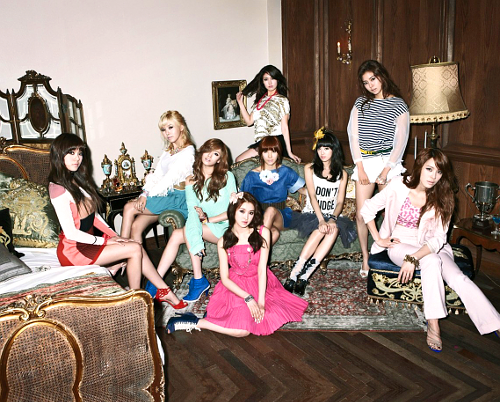 K-pop as a business is often associated with a machine due to its focus on perfection, its manufactured image, and its somewhat systematic material. Idol groups are made to be versatile, expected to be durable, and sold as products. Both machines and K-pop groups are made of different components to make one whole. In machines, some components are more valuable than others, and hey, the same thing can be said for K-pop groups. Of course, these idol groups aren’t machines as they are human beings with human limitations and eccentricities, but other than that distinction, I feel there is another notable difference worth discussing between machines and idol groups: interchangeability.
K-pop as a business is often associated with a machine due to its focus on perfection, its manufactured image, and its somewhat systematic material. Idol groups are made to be versatile, expected to be durable, and sold as products. Both machines and K-pop groups are made of different components to make one whole. In machines, some components are more valuable than others, and hey, the same thing can be said for K-pop groups. Of course, these idol groups aren’t machines as they are human beings with human limitations and eccentricities, but other than that distinction, I feel there is another notable difference worth discussing between machines and idol groups: interchangeability.
When American inventor Eli Whitney decided to work out the idea of interchangeable parts, he wanted a final product with components that could be replaced quickly and efficiently without many changes to product itself. Unlike the factors and pieces in machines, group members in idol groups are not interchangeable. You can’t add or subtract a member from said groups and not expect a drastic change. Yet companies still toy with the idea by adding group members in their already established groups or replacing members that leave (either willingly or forcefully) with new members. I’m not at all saying that companies make these changes and expect everything to be the same; they (for the most part) realize the risks they are taking. They know a change in dynamics is going to occur and will market it as a change, a change supposedly for the better. Whether the change really is for the better is arguable.
 The idea has recently gotten more attention due to two established girl groups, T-ara and After School, announcing changes in their groups in the near future. After School is preparing for another new freshman, Shin Ga-eun (shown on right), while Core Contents Media, T-ara’s company, confirmed the addition of two more (currently unknown) members in T-ara’s roster and a potential withdrawal of existing members.
The idea has recently gotten more attention due to two established girl groups, T-ara and After School, announcing changes in their groups in the near future. After School is preparing for another new freshman, Shin Ga-eun (shown on right), while Core Contents Media, T-ara’s company, confirmed the addition of two more (currently unknown) members in T-ara’s roster and a potential withdrawal of existing members.
For the most part, I’m against adding/replacing members. I almost always prefer the original group rosters or the roster I’m first introduced to since those members were the ones I went out of the way to remember and connect with from the beginning, the members that made me love the group in the first place. When a group adds a member, that’s another name, face, and personality you have to remember, another person you have to warm up to all over again. Likewise, when a group removes a member or replaces them, that person you grew to care for virtually disappears. Members who leave idol groups post-debut (yet pre-disbandment) rarely come back as popular musicians, with the only notable cases that come to mind being Jay Park (ex-2PM member turned solo artist) and Hyuna (ex-Wonder Girl turned face of 4Minute).
Another problem member changes is often times, after the inclusion or exclusion of a member, the whole group’s image ends up changing. When you add a member, you have another set of skills you need to display, another demographic you could potentially cater to, and another person to designate lines to. When you get rid of a member, you lose a set of skills, a demographic, and their involvement in previous work. And those changes could potentially change the group altogether. And while you may get new fans with the so-called “improvements,” what about those fans who liked the group before the changes were made? While companies do realize that they are making a change, I don’t believe they realize the extent of how much they are changing. They aren’t just changing the group dynamics, but they’re also changing the dynamics of the fandom, and have to go forward with that mindset.
Truth be told, what I said earlier about member additions is actually a best case scenario. Often, new additions won’t have much skills to contribute, and if they do, they won’t really get the chance to showcase their skills. They also often fail to get a demographic or fan base right away, and could even get an anti following for supposedly ruining the group dynamics (poor Henry and Zhou Mi…). T-ara already has a pretty bad track record with adding members since their first (and formerly only) addition,Hwayoung, was met with lukewarm reactions at best. She was said to be added due to her rapping ability, but we failed to see any of it due to T-ara’s songs just failing to showcase her. Even when we do see her rapping, it’s nothing fellow members Eunjung and Hyomin can’t already do. Furthermore, she’s even blamed for taking away parts from other members, especially Eunjung. Years after her addition, fans are still warming up to her. I’m sure Hwayoung has some talent somewhere in her; she was chosen to be in T-ara for a reason after all. But with what we’re given of her, calling her useless — as she is often called — isn’t that far off.
 But I’m not saying group changes are completely bad or unnecessary. There are cases where a member change really did get the desired result and then some, improving the state of the group indefinitely. A good example of this is KARA who only gained popularity and consequently their group’s image after the withdrawal of former member Sunghee, and the addition of Hara and Jiyoung. The addition of the two younger artists allowed Kara to take on a cuter, girl-door-image, an image KARA works best, and an image KARA will be remembered for.
But I’m not saying group changes are completely bad or unnecessary. There are cases where a member change really did get the desired result and then some, improving the state of the group indefinitely. A good example of this is KARA who only gained popularity and consequently their group’s image after the withdrawal of former member Sunghee, and the addition of Hara and Jiyoung. The addition of the two younger artists allowed Kara to take on a cuter, girl-door-image, an image KARA works best, and an image KARA will be remembered for.
U-KISS is also a pretty good example, especially when considering company involvement. It wasn’t the choice of Alexander and Kibum to leave; instead NH Media chose to be proactive and terminated their contracts, replacing them with AJ and Hoon. Ever since then, U-KISS’s material dramatically increase in quality, though whether the increase was due to the member change is still arguable. And even though After School’s gimmicky freshman system will probably lead to problems in the future, it is helping the group overall. While I prefer the members and overall image of the original line-up, I can’t deny that Uee, Nana, Raina, and Lizzy definitely helped the group gain attention, even if that attention is due to their looks. As for E-young, she is facing treatment similar to Hwayoung. I believe she has amazing talent with instruments, but unless it’s properly showcased, E-young’s existence in After School is basically a waste.
So now, with all that said, what do I think of T-ara’s and After School’s upcoming changes? I have trouble seeing how T-ara will gain benefits from this since they already have a huge problem with line distribution. Basically, T-ara’s current material has Soyeon, Eunjung and Hyomin carry the song with the other members getting minimal if any lines at all. If they already have that problem with seven members, I can’t imagine the situation with nine, even if the two new additions actually have something to offer. As for the removal of members, it might make sense since some members don’t really contribute anything, but I’m still against it. I feel like T-ara is just starting to hold its ground in the industry, and while their fan base can probably handle some additions, I think a removal might be too drastic of a move. Remember, this is the overworked T-ara we are talking about. A removal of one of the members at their current state — especially with laziness as the reasoning — would be too hard of a punch, and fans would definitely react accordingly.
As for After School, I see potential for them to benefit from their most recent addition. Based on the information currently released, Ga-eun is supposed among the best vocalists Pledis has to offer and is capable of speaking Japanese. So at least she’ll contribute something to the group with her voice, and will be able to help out when After School promotes in Japan. But until we see the changes take effect, we can only make predictions of what’s to come.

Basically, this quote from a LOEN executive sums up my thoughts exactly.
Groups aren’t like toy robots, where you can snap the arm off and put it back on again… The group as a whole is the artist. They are not trinkets that can be assembled and taken apart.
Groups aren’t interchangeable, as the members make the group what it is. But member additions/subtractions can potentially help a group define who they are as artists and improve from then on, since if you notice, the groups that benefited from a member change really didn’t establish their group image yet. Honestly, I’d rather have companies focusing on improving the quality of their existing members first, but sometimes, a well-planned, well-timed member change can give a group the distinction it needs. Since sometimes, the first try isn’t going to work out as expected due to lack of chemistry or whatever the reason. But why try to fix something that already works, like what After School and T-ara are doing? What do you think of this Seoulmates? How do you think the T-ara and After School fiascoes are going to play out? What do you think of group changes in general? Leave your thoughts and more below.


